
This review may contain spoilers
Breathtaking Love Story About Letting Go of the Past
Ever since I began really getting into K-Dramas, the one series that has eluded me is this one. It wasn’t in the US region, and I’d heard so many things about it that I kept trying to figure out a way to watch it. Fortunately, moving to Taiwan put me in a different Netflix region, and I almost missed it again, because it’s under the title, “Guardian: The Lonely and Great God.”My expectations for this series were surpassed in every way. I was slightly worried that the reputation of the series would somehow come up short. It didn’t. This is one of the most charming and transcendent love stories I have ever seen. It’s light, beautiful, and full of laughter and tears. In short, it’s full of Life. And perhaps that is why it has touched the hearts of so many.
The four leads of this series are all captivating and you scarcely want to blink for fear of missing something whenever any of them are on screen. Gong Yoo (Kim Shin) has the smoothest, most soft-spoken, and calming voice I think I have ever heard. He reminded me of Cary Grant, one of history's most romantic and effortless actors. He has such charm that he doesn’t have to do much to be in awe of his performance.
I haven’t seen Kim Go Eun in many things, but this is easily the most vivacious and endearing role that I have seen her in. She plays Ji Eun Tak to perfection. She has such a lovely smile and bubbly personality that you can easily see why Kim Shin is so taken with her. Despite her hardships, she simply oozes Life itself.
Lee Dong Wook, the grim reaper with a past, plays the very heartbroken and wounded soul who somehow senses that he’s done something terrible in his past. I’ve seen this talented actor in several series now. As good as Gong Yoo is at acting with his eyes, Lee Dong Wook shows us every ounce of pain that his character is going through. We feel it. We eventually know of the horrendous things he’s done, but in the end, all we want is for him to let go of the pain.
Finally, we have Yoo In Na, an actress I have only seen one other time in “Touch Your Heart.” She is such a charmer with that incredible smile of hers and her very youthful expressions. Only Yoo In Na can take a somewhat conceited character and make her likable and pleasing. She did the same in “Touch Your Heart” and it’s obviously something she’s a master at doing. In many ways, she’s a character who’s torn between the Goblin and the Reaper, and we somehow sense that she knows this. Perhaps that it also why, despite the pain of the past, she’s the strongest of the three because she’s actually able to let go.
While this is an absolutely endearing love story, the series’ power is its message of forgiveness. Everyone carries baggage around, holding on to the painful experiences of the past with the weights of guilt and shame for the things we’ve done. For the Goblin, this is represented by the sword. For Sunny, it’s the ring. And for the Grim Reaper, it’s his hat. And the glue that binds them, with the wisdom of living a free and carefree life, is Ji Eun Tak.
How long must people continue to suffer before we let ourselves and others off the hook? Punishment does not come from anyone or anything except for ourselves. So, how long will you continue to carry the burden? Release lies in the wisdom and power of forgiveness, which is the process of letting go. Leave all of your burdens behind.
The music of this series mirrors the series itself with light piano pieces and soft songs that always seem to mirror the story, the characters, and even the environment. I loved how part of the series was filmed in Quebec, obviously during the fall season when the scenery is at its most captivating.
The series doesn’t miss a beat with some outrageously hilarious moments. One of my favorites was when the Goblin and the Reaper are trying to figure out how to use a cell phone and the camera that goes with it. Gong Yoo and Lee Dong Wook had me laughing so hard during that scene! It was priceless.
Korean performers are masters of emotion. The tears that were shed were so powerful and convincing by all four actors, that it had you really feeling those moments of sadness and pain. That is what separates Korean actors from so many others: they make you FEEL it! When Ji Eun Tak loses the Goblin, and she begins to wail uncontrollably on the rooftop, you can’t help but feel her pain and despair. The same happens for the Goblin in the last episode. But alas, all is not lost. No one goes away forever, and that is another aspect of the story that is truly beautiful and what made that final scene so epic.
Goblin is easily one of the best series I’ve ever seen, and at some point, I will certainly wish to sit down and watch it again. Goblin is like sitting at home under a warm blanket, drinking a cup of hot coffee in front of a fireplace while the autumn leaves fall outside in the crisp air with the reminder to enjoy Life and each moment.
Was this review helpful to you?

This review may contain spoilers
There Is Nothing So Precious or Comparable to a Mother's Love
This is a series involving a mother who begins to realize that her “Tiger Mom” philosophy is not the way to be an effective, loving parent and that being “strong” doesn’t mean being abusive. I’ve encountered many “tiger moms” in my job as an ESL teacher, having worked in Korea, China, and Taiwan. The most abusive parents I have ever encountered are tiger moms and the moms of the West who treat their children with indifference. Both are forms of child abuse. Believe it or not, there are worse forms of abuse than just physical.Unfortunately, in the case of tiger moms, these are parents who demand total, complete control. They will claim that it’s being a good, loving parent when nothing could be further from the truth. These are parents who map out their children's lives and deprive them of the ability to decide anything for themselves. In short, these are parents who live vicariously through their children. They use their children to feel better about themselves. Under such parents, children rarely have the chance to even be children.
Jin Young Soon is a widowed pig farmer whose son, Kang Ho, is born shortly after her husband’s death. She immediately decides that her son should become so powerful that nobody can hurt him. She already decides that he will be a prosecutor. He is forced to study at all hours, can only eat a certain amount of food because he might get sleepy and be unable to study, and he’s never able to go on class trips. When he breaks any of these rules, he’s soundly beaten to the point of severe bruising. When he uses some time to draw, his mother tears it up. When he plays on his computer, she throws the computer into the fire. Yes, at this point, she is a truly horrible mother. Such abusive tactics are born out of fear not love.
This series throws us a series of curveballs that might be challenging to predict, which is another reason why the writing is so taut and expertly written. Kang Ho in a final outburst to his mother, decides to leave her and find a way to increase his power by marrying Oh Tae Soo’s daughter and being adopted by Song Woo Byeok as his son—the local crime boss who is also Kang Ho’s father’s murderer. Of course, nothing is as it appears to be. The viewer is left to wonder if Kang Ho has really grown up so resentful of his mother that he is willing to consort with these horrific people. Oh Tae Soo was the prosecutor who swept Kang Ho’s father’s case under the rug and now has aspirations to become Korea’s new president.
We find out later down the road that everything was a ploy in an attempt to bring down Song Woo Byeok and Oh Tae Soo, except that it backfired and nearly cost Kang Ho his life. After his attempted murder, Kang Ho’s mind is reduced to that of a child, and his memories are lost. Now back with his mother, they are both given a second chance. Kang Ho’s chance is to recover and hopefully be able to finish what he started as well as mend the bridges he’s burned. For Jin Young Soon, it’s a chance to maybe be a better mother than she was before. Much of it is a bit of trial and error as Jin Young Soon still has much to learn about how to be a good parent. She still resorts to abusive tactics, but down the road, she finally realizes how her abusive methods have hurt Kang Ho as well as others around him.
Jin Young Soon and Kang Ho live in a small, remote farming village made up of some of the quirkiest and most delightful characters you’re ever likely to encounter! Son Yong Rak (Kim Won Hae) is the village head, and this actor has a true gift for comedy. Having seen him in several other series, I smiled as soon as I saw him because I know how good he is! He’s married to a very odd, woman who is always wearing a facial mask and has a knack for saying things at the worst times.
Jung Gum Ja (Kang Mal Geum) is Jin Young Soon’s best friend and ironically has a daughter (Mi Joo) who was born at the same time as Kang Ho. Mi Joo is Kang Ho’s love interest, and it’s very heartbreaking how he leaves her in order to pursue his goal of taking down Song Woo Byeok and Oh Tae Soo, because he believes it’s too dangerous for her, but of course, he doesn’t tell her that. Little does Kang Ho realize that Mi Joo’s twins, Ye Jin and Seo Jin are, in fact, his children. This was one of the few parts of the story that wasn’t a surprise. By the way, Gi So Yoo (Ye Jin) and Park Da On (Seo Jin) are delightful little performers! What talent these two have! I enjoyed their scenes together so much, and I was amazed at how good they are!
Lastly, we have Sam Sik, who is the dimwitted son of Jin Young Soon’s neighbors. He falls in with bad crowds, gets thrown into jail, and ends up indebted to a loan shark. He’s also in love with Mi Joo, even though she has absolutely no feelings for him at all. Yoo In Soo does a fantastic job playing the funny but not very bright Sam Sik who is always in some kind of trouble. However, his heart is usually in the right place which makes him likable despite his obvious flaws.
Performances are outstanding across the board—in addition to the great performances already mentioned above—Ra Mi Ran (Jin Young Soon) is incredible, but frankly, Lee Do Hyun gives us a mesmerizing performance as Kang Ho, especially during his depiction of Kang Ho with a childlike mind. Lee Do Hyun deserves every accolade.
The series is an endearing story about the mother/son relationship, on the one hand, but it’s also a fantastic thriller as well, as we are left to wonder after the first episode, how the despicable Song Woo Byeok and Oh Tae Soo will finally be brought to justice. We also learn why Kang Ho is such a great prosecutor as he devises a perfect plan to trap them both. Kang Ho’s biggest mistake at the outset of the series is that he tries to do everything himself. The second time around, he knows that he can’t tangle with these two criminals alone. He needs help, and he gets it. And perhaps, that is one of the essences of the series: everyone needs help, even mothers as Jin Young Soon also realizes that Kang Ho’s recovery wasn’t just due to her efforts but to everyone in the village who helped.
We have a heartfelt ending in which Jin Young Soon finally succumbs to her stomach cancer, and she leaves a beautiful letter for Kang Ho, apologizing for being such a horrible mother and declaring that she will do better next time. Her last wish is to be his mother again in another life.
As children, it’s often a painful realization to know that parents aren’t perfect. There is no manual or book to help. They make mistakes. A good parent admits to their mistakes and helps their children to understand that. The best parent is one who provides their child with the freedom to be who they want to be, as well as help them create and cultivate the tools and wisdom to make the best choices for themselves. But then again, children obviously make mistakes too, and parents have to learn to be understanding and compassionate as well as to let them know: I’m always here for you if you need me.
This is a beautiful series that confirms that there is nothing so precious or comparable to a mother’s love. Make sure to let your mothers know how much you love and appreciate them.
Was this review helpful to you?
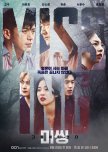
This review may contain spoilers
Cherish Your Loved Ones In Life While You Have the Chance!
First of all, before I begin this review, I need to make a recommendation for anyone who hasn't seen this series yet: get a box of tissues. You're going to need it."Missing The Other Side" brings a unique concept for this story. There is a staging area. A village that exists for people who have died but whose bodies have not been recovered. It doesn't really matter what your beliefs are, you simply have to just go with it. If you do that, you won't be disappointed, as this is one of the most beautiful, heartwarming stories I've ever seen. I had no idea that so many heartfelt moments would be in a 12-episode series.
Anyone who has experienced the death of a loved one, is likely to relate on some level. And even if you haven't, you'll very likely still feel touched by how the story-but most especially-how the relationships unfold between those living and those who have passed on.
The series is about a con man in Kim Wook, wonderfully played by Go Soo, who surreptitiously finds himself the unwitting witness of a woman who is being kidnapped. He soon finds himself the target of the kidnappers, and after a lengthy chase, he finds himself in a world he couldn't possibly imagine. A village where the dead live until their bodies are found. Of course, he has no idea why he can see, hear, touch, and communicate with them. The only other living person with this ability is Mr. Jang, a lonely man who has essentially stopped living due to the disappearance of his little girl years ago.
Detective Shin is brought on board, initially to investigate a construction company that seems to be tied to a series of deaths, both from the past as well as the present. Believing his fiancée to have dumped him, he quickly finds that she was the woman being kidnapped that was witnessed by Kim Wook. Unfortunately, we find out that his fiancée, Yeo Na Choi has been murdered, as she is the most recent addition to the village.
We also discover that there is a conspiracy tied to the construction company, and that there is someone else masterminding the disappearances, as well as the deaths, of so many people, including Kim Wook's own mother, whom he thought had abandoned him years ago. However, after seeing the locket on a village woman, Kim Hyun Mi, we quickly discover--as does Kim Wook--that she is his mother. At first, Kim Wook doesn't understand, as he's filled with resentment regarding his mother.
The interaction between Kim Wook and the villagers is nothing short of pure sweetness, as he finally finds a true purpose in life. The villagers are unable to leave the village until their bodies are found, and Kim Wook decides to help Mr. Jang do so. While Mr. Jang is still trying to find out what happened to his daughter, Kim Wook is also trying to discover who killed Yeo Na Choi as well as his co-worker Kim Nam Gook.
Some of the most powerful and profound interactions I've seen are scenes between Yeo Na Choi and Detective Shin as each--separated by death's veil--speak to each other but cannot see or hear each other. The amount of emotion that pours from their hearts and souls is beyond touching. It is something altogether more ethereal, soul-felt, and poignant that will have you grasping quickly for those tissues! That same is also conveyed between Kim Wook and his mother as each pours their heart out to the other. And while there is no interaction between Mr. Jang and his daughter, we feel his pain as he cries out in vain-at last finding some measure of closure-even if it isn't what he'd hoped for.
I am constantly amazed at how Korean actors can emote so easily and deftly. They are able to help us feel those deeper emotions through sobbing, as though their hearts are being torn open. When I lost my father in an accident when I was just nineteen, I suffered unimaginable heartbreak as though my whole world had been shattered. These actors and actresses are somehow able to tap into that emotional level. And I don't think it is as easy to do as people might think because I've rarely seen it done in western movies and shows. I think there is something that makes those actors hold back just a little. This entire cast is to be commended for such deep, complex, and profound performances!
I can't remember ever watching a series--aside from the classic show, Highway to Heaven--that had me tearing up as much as this one did. The story is compelling and enthralling as it is as much a mystery as it is in delving into what might be waiting on "the other side."
It's hard to feel grief when you know your loved ones are safe and well. Perhaps not in a way that we understand, but it still brings about some closure. More than that, you can't help feeling happy for each member of the village as they move on to another realm of existence as soon as their bodies are found. If only we had such clarity of knowledge when our loved ones do pass, it would perhaps make the grieving process a bit more bearable.
Watching movies and shows where children and women are victims of horrible crimes has always been hard. It breaks my heart. As a TEFL teacher, I don't even want to think of something like that ever happening to one of my students.
This series is nothing short of a work of pure art. Pure beauty. And perhaps also, pure hope. Hope that there is healing for those who remain behind as well as for those who have moved on. Perhaps the lesson here is to cherish those closest to us in life so that we may then cherish them in death. Don't waste a single moment to let your family and friends know how much you love and care of them. After all, there are only so many tomorrows, and you don't want to end up wishing that you could have said something when you had the chance. Let them know. Let them know now.
Was this review helpful to you?

This review may contain spoilers
Power or Love In This Epic Fantasy Series!
First of all, I must say that Season 2 cannot get here fast enough! When the last episode ended, I literally groaned that I had to wait but was actually thrilled that this story was going to continue. Such a lush and beautiful story is too good to end here.Once again, the Koreans continue to prove why they are the most proficient storytellers in the world in film and television. I’ve been trying to think of another fantasy series that was heartfelt and full of luscious characters like this one. The “Lord of the Rings” film series is the only other one that comes to mind. That tells me just how incredible this series has been. And what makes this series soar is that it is story and character-driven. While it has some incredible special effects, they only enhance the core, which is what is supposed to happen in high-quality story-telling.
In a fictional kingdom populated by mages, we have a power struggle going on to possess the “ice stone,” a stone of magic that can bring people back from the dead. Of course, anyone who seeks immortality would have a strong desire to possess such a relic. There is also a differentiation between magic and sorcery. Sorcery is forbidden magic that goes against nature itself. And one of the main devices of sorcery is soul-shifting. This means that a person dies but shifts their soul into another body. In some cases, soul-shifting can also mean trading bodies. This, of course, is forbidden magic.
At the center of the story is Naksu, an infamous soul assassin who was hunted down by the mages of the kingdom. Mortally wounded, she is able to soul-shift into another body and take her identity; the identity of Mu Deok. However, because of her new body, she has no access to her energy in order to perform magic. In short, she’s a regular person. However, her drive and desire to reacquire her energy and carry out her threat of killing those responsible for the deaths of her family members, is still very much at the forefront of her mind.
We then have Jang Uk, a somewhat spoiled and lazy young man who is supposed to be learning various forms of magic, despite also being cut off from his energy due to an edict from his father. He’s given no reason why, and so he spends much of his time lazing around and doing nothing until Mu Deok shows up and gets a job as his maid. However, it doesn’t take Jang Uk long to realize Mu Deok’s true identity, and he asks that she train him and become his master.
One of the central themes of this story is what is more important? Power or Love? It’s ironic that most people find love to be a weakness. What they fail to realize is that power without love IS weakness. Love is the most powerful force in the universe. This is something that Mu Deok must face and decide, which becomes an important factor when she is ultimately forced to decide what she wants: her power back or Jang Uk.
The settings created for this series are absolutely incredible. I have to believe that most of the fictional towns are sets, and they are elaborate enough to rival any major film project.
There are so many amazing performances in this series, that it is incredibly difficult to pick one that stands out from the rest. Lee Jae Wook (Jang Uk) and Jung So Min (Mu Deok) are absolutely fantastic and they have great chemistry together. One of my personal favorites was Kim Do Ju (Maidservant Kim) who was too exquisite for words. She is such a lovely woman, and her performance really stood out for me. However, the performance of Jo Jae Yoon as the villainous Jin Mu was captivating, to say the least. More often than not, a story is only as good as its villain. Imagine Star Wars without Darth Vader or Lord of the Rings without Sauron. They just don’t work nearly as well, and Jo Jae Yoon gives a stellar performance as the villain behind the throne; the man pulling all of the strings. I’ve seen Jo Jae Yoon once before in “Descendants of the Sun,” but this role feels like it was tailor-made for him. He’s deliciously evil and corrupt with little smirks that make you want to hit him. What makes his performance so grand is that he never plays Jin Mu in an over-the-top way. We have no angry outbursts or rage-filled speeches. He’s calm, level-headed, and far brighter than people give him credit for.
Of course, as with so many Korean series, we have moments of love, humor, inspiration, and even wisdom. Koreans are masters of character. They are always multi-leveled and multi-dimensional, much like real people.
The fight scenes are all well-choreographed. Some of which reminded me a little of “Crouching Tiger, Hidden Dragon. I also like that they explain the magic. Robert Jordan, who wrote one of the most epic fantasy series of all time in his “Wheel of Time” series, is considered to have explained the science of his magic better than any writer ever. But Alchemy of Souls comes really close as we learn how magic and energy are used.
This series is grand on an epic scale. Even a 20-episode series with each episode at an average of 75 minutes went by at a clip because I was so vested in the show. As I stated before, I cannot wait until the next series comes out. They ended things on a great cliffhanger that made me keep looking at the clock and going, “Oh, no! It’s almost over!” Yeah, I didn’t want it to end. For me, this is one of the best fantasy series I have ever seen, and frankly, it was the central theme of love and power that kept me coming back for more. And yes, I can’t wait for more!
Was this review helpful to you?

This intelligent and creative show is about five young women who live in a share house. Of course, they come from different walks of life, have different backgrounds, and much like most people, each of them carries a secret. Like any roommates who share a living space, they get along, they laugh, they cry, and they often argue and fight. But make no mistake. These girls truly love each other and do their best to be there for each other. That is truly the beauty of this show. It proves that a "family" doesn't have to be your nuclear family. In fact, it's a bit interesting and ironic, that in some cases, these girls seem closer to each other than with their parents.
There are some truly touching moments that might tug at your heartstrings, some incredibly hilarious moments that might get you laughing out loud for a spell, and even some thought-provoking moments. In short, this show has just about everything.
First, we have Jin-Myung Yoon. Yoon doesn't say much, but when she does speak, she is honest and sincere, even to the point of being blunt. She comes across as cold, but she really isn't. Her "tough" exterior hides the wounded woman suffering through the pain of believing that she's alone. She's cautious about who she opens up to, and when she does, Yoon speaks her mind. She has a challenge of truly connecting with people and showing them who she is. However, she loves her roommates, and will do anything for them. She works three jobs and goes to school. She is the most mature of all of them, and she is my personal favorite.
Next is Ye-Eun Jung, who is probably the most immature of the group and has some serious self-esteem issues. She adores her boyfriend, despite the poor way that he treats her. Everything is about status with her. She cares about how she looks, what she wears, how much she weighs, and what everyone thinks about her. She is prone to be thoughtless, but she is also cheerful, cute, and despite her clashes with Kang, she also cares very deeply for her fellow roommates.
Ji-Won Song is the most energetic and creative of the bunch. She also has absolutely no problem expressing herself. She's never embarrassed. She will also frequently take the initiative in activities where others are hesitant. She lives her life a bit on the edge, and sometimes gets a bit carried away with the "truth." She is rarely ever down or upset, and she is the one most likely to try and cheer up a friend.
Kang Yi-Na is the only one who doesn't share a room with anyone else. A woman with a tragic past, she works as an escort. She also has no vices about walking around with little/nothing on, which makes some of the other roommates uncomfortable. She has more "life knowledge" than the other girls, especially about how men behave. She isn't tricked by the antics that men play, and this gets her into fights with Ye-Eun over Ye-Eun's naivety about her own boyfriend. It's a toss-up as to who is tougher: Kang or Yoon.
Lastly, we have Eun-Jae, who is the newest addition to the house. She is also the youngest with the least amount of life experience. Coming from the country, she is a young woman who is extremely naive about how things work. It is also very difficult for her to speak her mind or even speak up about things until it's already reached a boiling point. Very sweet with a timid personality, she is very much like the "baby sister" of the group. All of the other girls feel a sense of "protectiveness" toward her.
Not only is the writing top-notch, but so is the acting. These five women have a certain chemistry that can't be overlooked. They know their characters inside and out, and they make the show work! Each brings something special to the table, but it's those moments when they are truly looking out for each other as well as being there for each other that demonstrates the true power of the show.
I would guess that many people would love to have a "family" like this! Why? Because no matter what happens, at the end of the day, they truly love each other, and isn't that what a family is?
**Netflix finally released Season 2, and the show is just as good as ever, adding a couple of new characters, and leaving me hoping and praying for a Season 3!**
Was this review helpful to you?
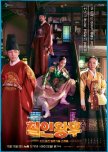
This review may contain spoilers
Appreciate the Brilliance of Shin Hye Sun in This Incredibly Entertaining Series!
I have seen Shin Hye Sun in three series before this one: Oh, My Ghost, Stranger, and most recently in Hymn of Death. All of the above are dramatic roles, and all I can say is, “Oh, my God!” Her comedic chops are off the charts! She is nothing short of brilliant, stealing virtually every single scene that she is in! I compare her to Lucille Ball. While the rest of the cast is absolutely fantastic, this series doesn’t work without Shin Hye Sun’s incomparable performance!Most body-switching movies and shows are same-gender switches. I’ve seen just a handful of cross-gender switches, and while they tend to go for comedic effects, the actors tend to overcompensate. The man exaggerates female characteristics such as speech and walking while the woman does the same. Shin Hye Sun, instead, goes for more subtlety and realism as a man who’s suddenly been thrust into the body of the Queen. Jang Bong Hwan is a chef from the future, so he not only has to figure out how to live in the body of a woman but also a woman who also happens to be of royalty!
What we end up getting is some of the funniest and zaniest roles I’ve ever seen. Shin Hye Sun brilliantly doesn’t even alter her speech very much. Just to the point in her smirk, the way she sits and communicates, which is Jang Bong Hwan’s style. In short, she gives us a very masculine queen as well as one from the future, who isn’t afraid to inject current idioms, terms, and ideas into her speech, often causing hilarious confusion among the Joseon people from 200 years ago who have no idea what she’s talking about. King Cheol Jong even begins keeping a Dictionary of the Queen’s Language in an attempt to understand her. He also has no idea why his once docile queen is now far more aggressive and direct in her speech and manners!
We are taken back to Joseon about 200 years in the past when a puppet king is being controlled by nearly everyone around him, but most notably by the Grand Queen Dowager, the Queen Dowager, and Kim Jwa Geun (the Grand Queen Dowager’s brother). It did take me a few episodes to get the names down because there are so many. Basically, you have two rival families in the Kim’s and the Jo’s who are vying for control of the country. The Queen is of the Kim family while the King is of the Jo family. Little do they realize that the King is far stronger than anyone realized or anticipated as he struggles to find a way to bring balance and contentment to his subjects, who mostly live in slavery and poverty. But the wild card in this drama is the Queen. No longer meek and docile, Jang Bong Hwan quickly decides that the Queen is nobody’s puppet and nobody’s fool. Instead, he figures out a way to understand his new role but also how to help the King gain power to stand up to those who would use him for their own purposes.
I’ve said this in numerous reviews already, but Koreans are masters of storytelling and always find a way to convey an uplifting message or something to think about to improve things. This series is no different. Overall, the series is comedic, but it does have some dramatic moments, some heart-wrenching ones, and also some inspiring ones too. In the end, we find that both King Cheol Jong and Queen Kim So Yong (after she’s reverted back to herself without Jang Bong Hwan) have both changed (even if Jang Bong Hwan left behind a few seeds of influence!). Jang Bong Hwan, himself, realizes that he is no longer the same, self-serving man that he was before either. He wisely states, “Perhaps it isn’t about trying not to be rotten, but instead cutting out what is rotten.” And that such an idea might—in fact—help to change the world, but it first begins with changing yourself. Gandhi himself stated as much when he said, “Be the change you wish to see in the world.”
This is simply one of the most delightful series I’ve seen, and it is literally rock solid from beginning to end. I kept waiting to see if the story would begin to falter or drop off slightly toward the end. It didn’t. It kept me completely invested from beginning to end.
Unfortunately, the government in Joseon from 200 years ago proves that not much has changed in the world since that time. The rich still oppress the poor. The powerful still exploit the weak are always in search of ways to retain even more power. Mr. Queen gives us some food for thought; that just because that is how things are, it doesn’t mean that nothing can be done or that they must somehow stay that way. King Cheol Jong and Queen Kim So Yong give us two examples of what can be done if will, determination, and courage are vested. Or perhaps one of my favorite quotes from Lord of the Rings: Even the smallest person can change the course of the future.
Was this review helpful to you?
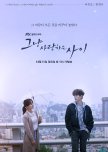
This review may contain spoilers
Imbalanced Romance Between the Heroic Kang Doo and the Immature, Cowardly Moon Soo
Kang Doo and Granny end up being the only two truly noble and likeable characters in this entire series with Ma Ri and Jung Yoo Jin being right behind them. The show would have been so much stronger and better if even Moon Soo had even half the character of Kang doo. In the end, we realize that she doesn’t even remotely deserve him.Kang Doo and Moon Soo are survivors of a horrific accident; a newly built shopping mall that collapses on them when they were teenagers. As the story unfolds, we find that Kang Doo is about as noble and heroic as a person can be. Yes, he’s got a temper, and for a while, he feels pathetic and unworthy. But not only does he rebound, he is always looking after people; looking after those he cares about; and even beyond that, he’s always THERE for them. That’s the mark of a truly noble person. Jun Ho Lee should’ve won every single acting award out there for giving us a harrowing and complex depiction of a Kang Doo who is always in pain, always struggling, always fighting, and always doing right by people. He mirrors the famous quote of Rocky Balboa of, “Life ain’t about how hard you hit. It’s about how hard you can get hit and keep moving forward.” Does Kang Doo stumble and make poor decisions? Yes, but he always quickly sees that there is a better way. He’s a man who’s continuously tormented.
Moon Soo, unfortunately, is someone who finds it safer and easier to just stay within her little bubble world. One could argue that Kang Doo has had a much harder road in life, and yet Moon Soo lacks the courage and even the conviction to fight and be there for those who need it. Actress Jin Ah Won is almost a complete opposite from Jun Ho Lee. In fact, she’s easily the weakest actor of the ensemble. Her expressions are often stoic and bland. She looks like a 15-year-old and she gives us a Moon Soo who acts like it too. It’s nearly laughable the times that Kang Doo tries to hug her, and she recoils like an 8-year-old child who’s had a spider dropped down her shirt! It shows her level of immaturity.
What really angered me was when Moon Soo finds out about Kang Doo’s health condition. At this point, she’s not even talking to him at all. She’s ignoring him. He goes to her house to tell her about his problem. Without even opening the door, he faints. She then gets angry with him for not telling him! How exactly does THAT work?!? I was like, “Are you kidding me?! You were ignoring him and you blame HIM for that?!” That was my last straw with Moon Soo. From then on, I had no heart or sympathy for such a cold, cowardly character who is unable to see past her own pain. Throughout the series, Kang Doo is always there for her. And throughout the series, Moon Soo constantly comes up short because she can’t be there for him when he needs help, and she invariably and conveniently ignores and forgets all that Kang Doo has been through. She completely dismisses it and even his condition when she hasn’t the guts to deal with it.
I’ve been watching K-dramas for nearly 5 years now. I’ve seen so many good ones and a few bad ones. However, I can’t remember one where I’ve found the leading lady so unappealing.
I can’t even sympathize with Moon Soo when she tearfully asks her friend, “Why does Kang Doo have to go through this? Hasn’t he been through enough? Why is this happening to us?” Funny questions from a person who can’t even be with him when needed, and by someone who’s blatantly ignored him. How can there even be an “us” when you refuse to be a participant or even show up!
The characters of Granny and Kang Doo keep this series afloat. By the last episode, I nearly decided to forget the whole thing as I was so fed up with Moon Soo. I wouldn’t wish a “Moon Soo” on anyone. She’s about as supportive as a piece of used tissue.
Kang Doo and Granny make this series a “10” for me. Moon Soo makes it about a “3” or “4”. Not to mention that actress Jin Ah Won is about the worst kisser I’ve ever seen! Kissing her must be like kissing a dead fish. No heart. No feeling. It says a lot about Won’s comfort level and her ability to even act out a simple scene like that.
While the story is an intriguing one, this definitely isn’t a series I’d watch again. It deserved a much better actress than Jin Ah Won; someone seasoned and professional enough to really give us a likeable and intriguing character with a complexity to match Jun Ho Lee’s performance. The imbalance really hurt this series. I certainly won’t look to watch anything else by Jin Ah Won. She sticks out like a sore thumb in this series against far better performances by nearly everyone else who all overshadowed her.
Kang Doo’s sister is almost as bad. Not even a hug or word of support for a brother who’s dying. Was it the writer’s intention to give us such cold, unfeeling women in this show? If so, he succeeded! He gave us two mothers who aren’t even worthy of the title.
Kang Doo is a hero in every sense of the word for always doing right by others; for always looking out and caring for others. The true shame is how no one was able to do the same for him.
The series also ends way too conveniently with a "magical" and unlikely ending. The writer didn't have the guts to go down the road less traveled and realize that Moon Soo might have actually learned the most about herself and appreciated Kang Doo had he not survived. The ending was a real cop-out which undermined much of the premise of the series.
Was this review helpful to you?
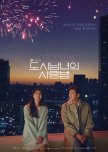
This review may contain spoilers
Fun and Frustration of Dating and Relationships!
This is a fantastic series that attempts to put things into perspective regarding dating and relationships. Anyone who has dated or been in any kind of a relationship will almost surely find himself/herself relating to one or more of the six characters (three men and three women).The series is mostly light and humorous with some occasional serious tones. Fortunately, the series is so deftly told that it easily transitions from "comedy" to "drama" without batting an eye.
As anyone knows, dating and relationships can be fun and exciting when they begin, but soon grow into frustration and turmoil the longer they go on. As one character points out, "Relationships are like wars. Easy to start. Difficult to end."
The series is filmed like "The Office" in which a small documentary team follows the characters around and asking questions such as, "Is it possible to have a positive break-up?" or "What does the word "first" mean to you?" The answers are often compelling as well as humorous.
The characters begin to realize some deep truths regarding relationships. Most people enter them to prevent lonelines or because they don't like themselves, and they expect someone else to fill in the "gaps" and "holes" that they feel are dotting the landscape of their lives. Of course, entering into relationships for these reasons means that the relationship is already doomed to fail. Why? Because unless you love your Self first, you cannot possibly share what you do not have with someone else. And the other person soon realizes how unfair it is to be pressured into being the sole source of happiness for someone else.
To be in a relationship means to accept your partner as they are. Eun Oh Lee makes a truly provocative and wise request to Jae Won. "Can you accept me for who I am? I'm a mess, and I have a long way to go before I find myself." Acceptance and awareness of dysfunction is probably the ultimate key to having a successful relationship. After all, relationships aren't about filling gaps and holes. They are about sharing. And ultimate sharing cannot be experienced until absolute vulnerability is attained.
The series is masterfully done, and the actors expertly handle their characters like prime jockeys handling their horses. They bring tears and laughter to a subject that has befuddled nearly every person in every culture since the beginning of time.
My favorite scene is Rin-Yi standing up for herself after her boyfriend basically tells her how he's ashamed of how she lives her life. Shame has no place in any relationship. Don't let people use "shame" to tell you how to live your life. The only real shame they feel is for themselves.
I have seen more and more of these types of series coming out of Korea where the writers are virtually crying out, "Let people be who they are! Stop trying to control everyone and everything!"
Along with the characters, you'll likely find yourself sharing in their laughter, fun, and frustration as Korea continues to churn out the best shows in the world, in my opinion.
Was this review helpful to you?

This review may contain spoilers
A Cute and Fun Series!
Coming on the heals of “Hidden Love,” I decided to do another Chinese drama (my second one). “When I Fly Towards You” is actually a very light and delightful series, although it lacks the depth and heart of the previously mentioned series. It’s a series that doesn’t really take any chances or risks. This isn't necessarily a bad thing, but I felt that there were missed opportunities, and thus, this series, while very good, is very “vanilla.”While the series is about a quiet, shy boy and a perky, vivacious young 16-year-old girl, the series could have almost been called, “School Friends” or something to that effect. I’d say that a good 40-45% of the series is focused on the five friends in their high school days, and the rest is on the two protagonists who should have been the focus and had more screen time.
Su Zai Zai is a very upbeat young girl, who always has a smile on her face, and certainly isn’t shy at all. If you’re looking for the doe-eyed girl who bats her eyes and waits for the boy to make his move, Zai Zai is not that girl. She is tenacious in the pursuit of her dreams and goals, and she makes no apologies for her direct and abrupt manner. Her target is the very quiet, shy boy, Zhang Lu Rang.
Zhang Lu Rang is a boy who barely cracks a smile. He quietly goes about his days, even when girls are lining up to have a chance with the handsome and brilliant Lu Rang. However, he gives none of them even a glance…that is, until he runs into Zai Zai at a small corner store. Her first reaction is to call him “an idiot” for walking to the store without an umbrella. She quickly regrets her reaction, and as soon as she sees him again at their military training, she’s quickly in hot pursuit. She teases him, playfully needles him, and showers him with cute remarks. Anything to bring this quiet boy out of his shell. At first, he tries to shrug her off, but Zai Zai’s charm and quick wit soon begin to melt the “ice king.”
We soon discover the reason behind Lu Rang’s shyness, which we realize is a result of very low self-esteem. His parents are both tiger parents, some of the most monstrous forms of child abusers there are. Only westerners with their indifference toward their children would give tiger parents a run. I know first-hand because I am an ESL teacher and have seen some of the most horrifying things from tiger parents and how they abuse their own children. Lu Rang is constantly berated by his parents, especially his mother who believes that he is a failure, despite his exemplary grades. His younger brother is the golden child of the family, who outshines even Lu Rang academically. There are no warm words of encouragement or comfort from Lu Rang’s cold mother during their exchanges, and it’s quite clear that Lu Rang’s brother is the favorite.
Zai Zai uses her charm and love for Lu Rang to let him know that he’s none of the things that his parents believe him to be. She becomes a ray of hope for him, as he very slowly begins to grow in confidence. Zai Zai simply won’t give up on him, nor will she allow him to sulk alone. Bubbly and perky, Zai Zai always finds a way to get the smallest crack of a smile out of Lu Rang.
The series ran into a crossroads. Focus on Zai Zai and Lu Rang or focus on the group of friends. Rather than picking one road, it tried to do both. The focus of the series should have been on Zai Zai and Lu Rang. I wanted more scenes with them. I wanted to find out how Lu Rang is able to resolve his problems with his parents—if at all. Instead, his parents all but disappear from the series from about the 12th episode. This is an area that could have, and should have been, explored in more depth as well as come up with more ways of showing the transformation of friendship between Zai Zai and Lu Rang into romance. Unfortunately, when you try to give the same attention to two stories, you end up coming up short in both. The old Native American saying of, “If you chase two rabbits, you’ll lose them both.”
“Hidden Love” dared to delve deeply into the characters of its two protagonists, and the payoff was well worth it. We felt close to these characters, caring about how they were going to overcome their obstacles. In this series, there really isn’t ever any real conflict or problems that Zai Zai and Lu Rang must deal with. For Zai Zai, it’s dealing with her boss acting like a pimp with her. For Lu Rang, it’s talking things out and resolving things with his brother.
It's the charm and performance of the cast that really makes the series work, despite not having the courage to delve more deeply below the surface. There are many funny and cute moments that still make this series more than watchable, but I just couldn’t help feeling that it was also a missed opportunity.
We still get those really awkward and silly intimate moments where college-aged kids act like 13-year-olds whenever a kiss, a hug, or even holding hands might occur. They make too big of a deal out it, which also flies in the face of logic and reality, even in China. They react as though they are about to commit a crime.
Zhang Miao Yi (Zai Zai) is a cute performer. With those eyes and dazzling smile, we can see why so many are captivated by the amount of charm that she brings to the table. She’s a bit inconsistent with her romantic scenes, however, especially her kissing scenes. Many of them felt wooden and forced. If you’re an actress who doesn’t like doing these kinds of roles, then you simply shouldn’t do them. There were times when she was very believable with Zhou Yi Ran (Lu Rang) and others when she almost looked out-of-place.
Zhou Yi Ran was good too, but he needed to find a way to make Lu Rang likable and charming, despite his shyness and low self-esteem. Too often, he came across as stiff. It’s a tough task to balance these traits, and yet, that is another reason why the series should have allowed him to do more had they put him front and center rather than being a peripheral character too often.
Because of the imbalance between the two plots, the series also suffers from pacing issues. We’d get an episode to update us on Zai Zai and Lu Rang, and then we’d get one that scarcely showed them at all, which leads us to a warp-speed ending in the last two episodes where we constantly jump years ahead within the space of a few minutes. It felt as if the director said, “Okay, we’ve got to hurry and wrap this up!” It didn’t have the natural feeling of an organic ending like “Hidden Love” had.
If you’re looking for something very light and fun without much else, then you’re likely to enjoy this series!
Was this review helpful to you?
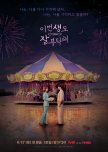
This review may contain spoilers
A Love That Trancends Time and Space!
This is a series that transcends both time and space. It reminds me a little bit of the movie “Somewhere in Time” in which a man finds out that he’s had a romantic relationship with a woman from over 70 years ago—but from his viewpoint, she is the only one who knows it.What we have here is Ban Ji Eum, a woman who has the ability to remember her past lives. In this case, she remembers 18 of them and is currently in her 19th lifetime. Interestingly enough, her 18th life touches on people around her and carries over into the 19th because she dies at the age of 12 in a mysterious auto accident that we come to realize was no accident at all which also yields to a present-day mystery involving her as well as Moon Seo Ha, a boy she knew from her 18th life and is now infatuated with in her 19th. Don’t worry. It sounds more confusing than it actually is. What we end up having is a very endearing and touching story.
Each time Ban Ji Eum reincarnates, she not only remembers who she was in previous incarnations, but she also remembers the things she’s done. In short, she also brings the skills she’s learned in the past into the present—everything from a trapeze artist to a flamenco dancer to a master bowman. We also find out that she’s also been both male and female as well. Her strong desire to reunite with Moon Seo Ha is what causes her to reincarnate in this current lifetime. Of course, Moon Seo Ha has no idea that Ban Ji Eum is the same girl who tragically died protecting him (Yoon Joo Won), and he’s still traumatized by the loss of his only friend—a friend that he obviously loved very deeply as well.
People obviously have different ideas about reincarnation. Most people in the West simply do not believe in it, despite several subtle references in the Bible as well as other texts. People in the East are far more likely to believe in it. For the story to work, it really doesn’t matter if you believe in it or not. There have been documented cases of people who vividly recall past incarnations. For most people, it’s a place they remember. An Indian man toured the Tower of London and remembered a door in a specific place. The tour guides all told him that no such door existed. He insisted it was there. Reluctantly, they checked it out, and sure enough, the door was where the man had said it was. They were naturally astounded and wanted to know how he knew. He simply said, “I remember it being there.”
There’s a reason why people are not necessarily meant to remember past lives. The primary reason is that it would overload you with unnecessary memories that are best left forgotten. Imagine remembering all of the suffering and grievances of your past lives and the toll they would take? Not to mention all of the suffering and grievances that you may have inflicted upon others as well. No, it is actually a gift to not remember, and in the end, it would serve no useful purpose. Even now, most people dwell on the past or the future, and not on where their attention needs to be: the present.
While it may seem fascinating to remember so many lifetimes, we quickly find that it is a great burden for Ban Ji Eum, as she attempts to find out why she’s one of those very few people who is able to remember. She knows there must be a reason, and Kang Min Ki is a mysterious archaeologist who holds the key. We all carry things forward—especially harsh grievances which must be forgiven and let go. This is the wisdom that Kang Min Ki tries to help Ban Ji Eum realize. This is also why forgiveness is one of the most powerful methods of letting go of the past and allowing oneself to move on.
The story takes some unexpected twists as Ban Ji Eum confesses who she is to Moon Seo Ha and also to Yoon Cho Won—her sister from her 18th life. Of course, they can scarcely believe her at first, but then Ban Ji Eum knows things—details—that only Yoon Joo Won would know that helps Ban Ji Eum convince them. These bring some incredibly touching moments, and people can also take solace in the fact that our loved ones are never truly gone or taken from us. They simply change form for a new role.
The only aspect that didn’t quite work for me, was the end. It made no sense that Kim Ae Kyung (a niece from Ban Ji Eum’s 17th life) and her survival depended upon Ban Ji Eum undertaking a ritual that would effectively wipe out all of her memories of her past lives, including those she’s interacted with in her current life. It would have made more sense if the ritual simply removed her memories of her past lives without affecting her current one. I understand that the writer was probably trying to find a more dynamic and unique way to end the story, but it didn’t work very well. Also, remembering past lives isn’t something that’s going to necessarily bring harm to those closest to you. However, I can understand Ban Ji Eum’s desire to remove the burden of remembering so many incarnations. Had they gotten the ending right, this would easily be a perfect “10” series for me, as it keenly held my interest from start to finish.
Performances are astounding, especially Shin Hye Sun, who never fails to impress me. She’s like a Korean Meryl Streep. She can literally do anything put forth to her, and she always turns in amazing performances. She is currently my favorite Korean actress. Everything from a thriller (Stranger) to comedy (Mr. Queen) to historical romance (Hymn of Death) to this one demonstrates that the mastery of her craft is varied and diverse.
I also really enjoyed Ha Yoon Kyung who is also a fantastic young actress! Everything from “Hospital Playlist” to “Extraordinary Attorney Woo” to this drama demonstrates that this young lady’s got a bright future ahead of her. And Cha Chung Hwa (Kim Ae Kyung) is one of the best character actresses in the business. Ahn Bo Hyun (Moon Seo Ha) was fantastic as well.
If this story based in reincarnation tells us anything, it’s to get things right the first time, although people rarely do. There are two types of relationships: dharmic and karmic. Dharmic relationships are those where you have a natural, easy connection with someone. You are together simply for the joy of it. Karmic relationships are those that tend to be strained or have much conflict because there are issues that still need to be resolved. Obviously, our task—as we move in our circles—is to transform those karmic relationships into dharmic ones. So, why wait until the next lifetime, when something can be done about it now? Such is the power of forgiveness, which is the central theme of this series. Let go of the past—grievances and all.
Was this review helpful to you?

This review may contain spoilers
LIfe Is Choice
This is a wonderful character-study series that demonstrates one of Life’s great truths: Life is choice and you determine how you react to what goes on around your and the experiences that you have. We are given two characters with very polarizing ways of living. One embraces what happens, no matter what it is, and learns how to let go. The other plays the role of the victim and is constantly running away from life and the problems that inevitably come. By the end of the series, the viewer should be left with one question to answer: which path do you prefer?Mok Hae Won is a very lonely woman who flees her job and life in Seoul for the small town in the countryside. Her upbringing is filled with unhappiness, from a father who abused her mother, a mother who is so cold and distant that she rarely sees her. And when she does, her mom barely says anything at all. There are no loving words or even the hint of a smile. The same is true of Hae Won’s aunt, who is just as cold as Hae Won and her mother. In short, we find very quickly that this is not a pleasant family to be a part of. They keep their distance from others, mostly because they are so content in their own bitterness and unhappiness, that they don’t even want to take a chance on something better. These are three very miserable women who hardly have anything appealing about them at all.
Im Eun Seob is a young man who is quiet but steadfast in how he lives his life. He’s loving and never hesitates to help someone who is in trouble. He gives no thought to his own safety, nor does he ever ask for anything in return. His own family abandoned him, and he was left with a family who took him in and raised him as their own. This family is warm and good-hearted, and they aren’t afraid of trials and tribulations. In fact, they face things head-on.
This is especially true of Eun Seob’s little sister, Im Hwi, who is a young high school girl full of life and zest! She may be a bit conceited, but she also never fears expressing herself, no matter how it may offend others around her. Despite not being popular, Im Hwi never allows that to affect her. She’s a very strong, young woman who’s already mastered one of Life’s great lessons: it doesn’t matter what other people think of you. One might wonder how Hae Won might have grown if she’d had a friend like Im Hwi when she was in high school.
It's easy to blame our parents for our shortcomings and even problems and failings. But the truth is that we never need to look further than ourselves when things don’t work out. Hae Won is a weak woman who enjoys playing the role of the victim. And people who play the role of the victim are always cowards because they are intent on blaming everyone else for their problems. What is even worse about Hae Won is that she has no forgiveness or tolerance for the imperfections of others. She fails to realize that nobody is perfect, not even our parents, but we must learn to forgive and look past the flaws and imperfections that everyone has.
Hae Won holds a grudge against her high school friend, Kim Bo Young because of a mistake that Bo Young made. Yes, it was a mistake, and even Bo Young acknowledges it, but toward the end of the series Bo Young points out to Hae Won that most people have cracks and problems that make them imperfect. Still, Hae Won cannot see past her own pain.
Of course, a romance brews between Eun Seob and Hae Won—who Eun Seob has loved since high school, unbeknownst to her. He runs a small bookstore in the small town, and it’s clear that he loves his life, despite living a life that seems boring and ordinary. Eun Seob loves Hae Won completely, despite her flaws and imperfections, and he also realizes that as soon as winter is over, she will leave. Some people are fair-weathered people. They only stay until real problems arise, and then they flee. Hae Won is such a person, which is why the viewer already knows the inevitable.
The romance is sweet and touching, and the chemistry between Hae Won (Park Min Young) and Eun Seob (Seo Kang Joon) is real. But the romance runs together with the mystery of who killed Hae Won’s father, and how she will deal with the truth of the past. We already know that Eun Seob is a man who can deal with pretty much anything. He has a mountain cabin where he can go to collect himself and be with his feelings. He’s also quick to forgive as well as express himself to others without fear or reservation. He knows that Hae Won is not built like that. While both characters endure much suffering, especially in their childhood, we see how each character has chosen to deal with their adversity. One deals with it, and the other finds a way to run away from it. Eun Seob already realizes one of life’s truths: the quickest way out is always through.
Eun Seob also knows that true love is not about holding on, but about letting go, which is why –despite how painful it is—he lets Hae Won go because he also knows that she has to learn to deal with the past as well as find herself.
The world is full of Eun Seobs and Hae Wons, and it’s up to us to decide which one we want to be. We can embrace and endure what comes, or we can play the role of the victim and wallow in pain and misery like Hae Won, her mother, and her aunt.
I loved the simplicity and beauty of the piano music that went with this series. I felt it really added to the atmosphere and enhanced the story.
Performances were first-rate all around. I have to say that one of the standout performances for me was Kim Hwan Hee (Im Hwi) as Eun Seob’s sister. She had such a command of the role as the tenacious and loving Im Hwi. The best scene of the series for me is when Im Hwi tearfully begs Eun Seob not to leave when she believes he’s going to leave with his uncle, and never return. It was such a touching scene, especially as Eun Seob—being the loving man that he is—buys and replaces Im Hwi’s bike seat with the one she’s been wanting. She also pretty much stole every scene she was in. I hope to see more of this talented young lady!
Some people hate winter (analogous to difficult times) and can’t wait until spring arrives. Others embrace the cold and find a way to navigate it. Such is the path of human lives in dealing with life. This series was one of the best character studies that I have seen when it comes to how to deal with life. Remember, life is choice. So, which do you choose?
Was this review helpful to you?
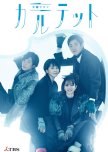
This review may contain spoilers
The Joy of Doing What You Love!
If you are not doing what you love to do, then by the time your life is winding down, you may look back with regrets because of how much time was wasted. Kobe Bryant put this to his listeners once during a conference. He said, “If you aren’t doing what you love, then why are you doing it?” I think very few people in the world do what they love because of so many factors: money (usually assuming a lack of it), what people will think (family, friends, society), or even because you don’t believe in yourself enough to take the chance. Let me point out something about people like Bruce Lee, Kobe Bryant, and others. They never rested on talent alone. They put in the work so that they could be the best that they could be. And, yes, that is what it takes.Quartet is a lovely story of four misfits. I call them “misfits” because they feel that they are outsiders who don’t seem to fit in anywhere. However, they all share one passion: the love for music. Three violinists and one cello player find themselves at a karaoke bar—seemingly by happenstance, but I think by the end of the series, we realize that it wasn’t an accident. One person sharing a joy is one thing, but it gains even greater power when four people combine their passion and talents.
Beppu is the leader of the group. He not only has a talent for the violin, but he’s someone how knows how to get things done. However, he doesn’t rule with an iron fist—unless it’s about taking out the garbage! He has no problem listening to the others and gaining their thoughts and feelings about something. His family owns the villa in the countryside where the four choose to live together and perform nightly at a local restaurant. The venue may seem small, and perhaps insignificant to some, but that’s not the point. They’re doing what they love.
Maki is the heart and soul of the group. A woman with a mysterious past. First, we’re left to wonder what happened to her husband, as her mother-in-law recruits Suzume to find out, as she believes Maki has killed him. We also find out that not is all as it seems with Maki, and will her dark past find its way into harming the group?
Iemori is easily the funniest member of the group with his quirky logic when it comes to identifying and discussing seemingly insignificant things. He’s always a source for a laugh, but make no mistake, he’s got a big heart. He’s almost childlike and in a good way.
Last, but certainly not least, we have our cellist in Suzume. A lonely young woman who loves playing her cello on the streets for whatever money she can get. She also wears her heart on her sleeve. It’s pretty clear early on that she truly loves the other members of the group, especially Maki. Perhaps this is the only true family Suzume has ever had. And when she begins to shed tears, it’s hard to hold back ourselves. She’s a little clumsy and has the propensity to sleep anywhere! Under the coffee table, slumped over chair, it really doesn’t matter. She will also do whatever she can to protect and help the other members of the group. We find out, very quickly, that she is not at all comfortable spying on Maki for Maki’s mother-in-law.
The group’s four members are endearing as they get to know each other throughout the series. Only one of them has a real job when the series begins. The other three are either unemployed or are about to leave their respective jobs. Of course, they begin to question the rationale of simply being a quartet. Even friends and family find it difficult to understand the logic of essentially doing something for very little. Toward the end of the series, it’s Suzume who answers this question when she talks about seeing the smiles on people’s faces or those rare moments when they get some feedback about how happy the listener is because of their music.
We also see the sad lives of those who are not living their passion and dreams. Arisu is a petty, vile young woman who works at the restaurant where the quartet performs. All she cares about is getting out there and finding a way to make a quick buck or perhaps find someone wealthy to take care of her. At one point, she schemes to steal Maki’s violin when she finds out how much it’s worth. She’s extremely self-centered, doesn’t care about anyone else, and it’s easy to see why she’s such a miserable woman. Even she finally finds her rich husband at the end, we also know two things: it will never last, and that type of happiness is always fleeting.
We also find a letter in the last episode from a musician who clearly didn’t make it as one. The person unloads their own frustrations and unhappiness at the group, unable to understand why they continue to play when they don’t play well. Of course, anyone who listens to this group can see that they play just fine. They may not be on par with some of the elite, but they can play! And the point is that they never gave up. They don’t let anyone or anything discourage them from doing what they love. This is showcased beautifully in the last episode when a can is thrown at them as they perform on stage, and many of the listeners get up and leave in the middle of the performance. However, what is truly magical is that none of these things prevents the quartet from continuing to play with smiles on their faces for the few who’ve remained behind.
In the end, if you are doing what you love to do, you don’t care if you’re doing it in front of a thousand people, a few people, or even none at all. You’re doing it for yourself, which is the most important thing. You don’t care if it brings you millions of dollars, a few dollars, or none at all. The joy of doing it is its own reward. And that is the beautiful message of this lovely series!
Was this review helpful to you?

This review may contain spoilers
It Actually Is A Wonderful Life!
The last Korean series I finished was “Missing the Other Side” which I thought was one of the most heart-warming, thoughtful, and provocative series I’d seen yet. It tugged at the heartstrings in a very profound and meaningful way. I had no idea I would get more of the same here with “Tomorrow.”Someone recently asked me why I watch Korean shows and not much else. I used to watch American shows, but I’ve dropped all of them. I said, “Because Korean stories are character and plot driven. And most of these shows always have food for thought, or a message to make you think about how we can make this world a better place.”
“Tomorrow” is about Grim Reapers who exist in a different plane of existence. They are broken up into various departments, but the department that is the focus of this story is the Risk Management Team, comprised of two members (soon to be adding a third). Their job is to seek out souls who are high risk for committing suicide and to try and prevent that from happening. The team is led by Goo Ryun, a woman with a mysterious and troubling past. Im Ryung Goo is her partner, another member also tied to a soul from the past. They soon add temporary member, Choi Joon Woong, a young man full of life, whom the Reapers accidentally put into a coma while trying to prevent a suicide. Woong is given the choice to join and help the Reapers for six months or stay in a coma for three years. Naturally, he chooses the former. Of course, being absolutely “green” Woong has a hard time initially fitting in and doing his job, but he brings two distinctive qualities to the team that the other two senior members lack: empathy and compassion. Woong is a young man who wears his feelings on his sleeve. He has a difficult time understanding the coldness of Goo Ryun, and the two often clash.
People may not realize that Korea has one of the highest suicide rates in the world. And the series addresses the most common causes of suicide. Bullying, the loss of a loved one, someone who views their own life as a failure, people suffering from things like eating disorders, assault victims, guilt, or drowning in a wave of public criticism. Each case spans 1-2 episodes, and each one is just as profound and thought-provoking as the last. This is another series you want to keep a box of tissues handy!
Of course, as in most cultures, suicide is against the law and in most religions, a mortal “sin.” It really doesn’t matter if you buy into the somewhat religious belief system that governs the Reapers. That isn’t what is important. What is important is helping anyone to see what a beautiful life they have, and why suicide should never be a last resort. Suicide only brings more suffering and pain than what you are already experiencing. It follows you.
The cause of suicide is unhappiness, and the feeling of being trapped in a reality you feel you cannot escape from. But the root cause of all unhappiness is this: lack of love for yourself. If you love yourself, you will not allow bullies to persecute you. You will stand up for yourself, no matter what. If you love yourself, you will grieve but feel immense gratitude for those loved ones who have moved on. If you love yourself, you will never see your life as a failure, but as a success. You will realize the truth: a single life touches so many. If you love yourself, you will never mistreat your body with eating disorders or unhealthy ways of living. You will take care of yourself as best as you can. If you love yourself, you won’t feel guilty about anything you do to others or anything you do to yourself, for you hold the tool for letting go: forgiveness. If you love yourself, even if someone beats and torments your body, you know that the body is not who you are! You will be able to say the most powerful words ever spoken: forgive them, for they know not what they do.
There is a lot of love in this series that cries out for people to see just how wonderful and valuable their lives are. They are not something to be callously thrown away. But perhaps the central theme of this show is this: there is only one person you ever need to save, and that is yourself. It also speaks to not giving up on yourself. Life is a battle, and you have to keep on fighting. Life will knock you down. Pain in inevitable but suffering is optional. How much you suffer is determined by nobody else but yourself. I’ve used this quote in several reviews, but it’s so powerful given the subject matter of this series. “The world ain't all sunshine and rainbows. It's a very mean and nasty place and I don't care how tough you are it will beat you to your knees and keep you there permanently if you let it. You, me, or nobody is gonna hit as hard as life. But it ain't about how hard you hit. It's about how hard you can get hit and keep moving forward. How much you can take and keep moving forward. That's how winning is done!”—Rocky Balboa. Anyone who is contemplating suicide should really look long and hard at this quote.
And while we are not responsible for what others do, we do have influence. People really need to stop and think about how they treat each other, whether it be through words or action. Put yourself in someone else’s shoes and think about how what you say or do might affect them.
This show has some of the most powerful scenes I have ever seen in ANY show! The Korean War vet being escorted by ALL of the Reapers was incredibly powerful and eye-opening about how war veterans are treated. Such people deserve our undying respect and gratitude. The story of the Comfort Women of World War II was especially poignant. People tend forget about the atrocities committed during that war. It’s always so much easier to lay blame upon others without knowing the facts or circumstances. If you don’t believe that, READ the quote above! Those women had undeniable courage and deserve the highest accolades for what they had to go through. That episode had me in tears at the end when the three women are there to comfort each other (thus, the comfort women!) and remind each other that no forgiveness is necessary.
Performances all around in this series were impeccable. The cast was tremendous, and the storyline between Goo Ryun and Park Joon Gil from their previous life in Joseon is very intriguing, as we unravel the mystery of the connection between these two, and why they both have opposing views regarding suicide victims. Goo Ryun believes they must be helped. Park Joon Gil believes that it’s pointless to help anyone who already has their mind made up, especially when it comes to suicide. And the bridge between them is none other than Choi Joon Woong. Because what is sorely missing from both is empathy and compassion. Judgment and criticism are counterproductive.
This series should be required viewing—and not just by Koreans—but by everyone. Perhaps you know someone who’s down and unhappy. Whether they might be contemplating suicide or not, use your own empathy and compassion to give them a smile, a kind word, your company, or anything to remind them that they are valuable and loved. For what other job is more important than that?
Was this review helpful to you?

This review may contain spoilers
True Family and Friends Are Forever
The central themes of this series are friends and family, and what exactly makes someone family. In many cultures, biological parents--no matter what--are given unlimited respect, even when love isn't present. As it was stated in "Boyz and the Hood:" Any fool can make a baby, but only a real person can be a parent. Of course, I'm paraphrasing, but that is the gist, and there is a lot of truth here.There are still those that might feel that adoptive parents can never be real parents. This is a lie...as much of a lie as saying that a biological parent is the only requirement needed. Mi-Jo's mother and Seon-Woo's father are despicable people who can never call themselves a "mother" or a "father."
Frankly, there are a lot of people who shouldn't be parents; those who are incapable of accepting the responsibility to love and be there for their kids. We see several examples of this throughout this series.
The series centers around three women, all of whom are thirty-nine, and have been best friends since high school. We quickly see just how involved they are in each other's lives, how much they love and care for each other. The strength of that bond is put to the ultimate test when one of them finds out that she is terminally ill.
While this may seem like a melodramatic plot, it really isn't. I am constantly amazed by Korean series and the actors and actresses who are able to simply "be real" in these types of situations. It's not too much and it's not too light. Perhaps that is why they are able to make the audience feel what they are feeling so acutely.
The three leads have undeniable chemistry as three besties! Chan-Young (Jeon Mi Do from "Hospital Playlist), Mi-Jo (Son Ye Jin from "Crash Landing On You" and Joo-Hee (Kim Ji Hyun). There is laughter, teasing and light bickering, joy and tender moments when these three are in a scene together.
What impresses me the most about this series is how family and friends are always there for each other through thick and thin, and it feels absolutely genuine, and this is tested when the time on this Earth is going to be cut short for one of them. We see how this affects each person who's intimately involved.
There's no denying the acting strength of the entire cast, but Joo-Hee (Kim Ji Hyun) was my favorite. She's the somewhat shy and slightly aloof member of the trio. She gives us grace through soft, warm smiles, and it would be a mistake to perceive her as being weak, when she, in fact, has a quiet strength. The scene at the department store with a very rude customer is a testament to this.
The other performance that impressed me was that ofJin-Seok (Lee Moo Saeng) as Cha-Young's love interest. When his voice cracks and goes high-pitch with raw emotion in several exchanges with Cha-Young, made me choke up a few times.
I also loved how these characters never gave in to abuse or intolerance. Mi-Jo's confrontation was a thing of beauty; nearly as impressive as Seon-Woo's showdown with his father.
The last episode will be a tough one to get through. Even when you know what's about to happen. That's the hallmark of great writing and storytelling; when you know what's coming, and it gets you anyway.
I dare anyone to get through the brunch scene with a dry eye, or the video message that Cha-Young leaves for Mi-Jo. Both were absolute scenes of beauty.
There aren't enough shows out there that truly showcase the power of family and friends; that demonstrate that love and being there for each other are the pillars of true relationships. If you don't already have such people in your life, this show may make you wish that you had. It will also challenge you not to take your loved ones for granted. We never know how much time we have with them. Spend it with love and devotion. In the end, Cha-Young is correct: quality is always more important than quantity!
Was this review helpful to you?
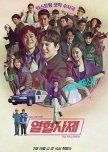
This review may contain spoilers
Exciting, Moving, and Hilariously Funny!
I've been watching TV shows for over 45 years. I've been watching K-dramas for the last four. And frankly, the Koreans seem to be masters at combining humor and drama, deftly shifting from one to the other. Nobody else does it better."The Fiery Priest" sees a Catholic priest--Father Kim--, who has no compunction about laying down some serious whoop-a** on criminals and those who seek to harm others. Of course, not all is as it seems as we learn about his backstory.
The series is about murder, political corruption, religious corruption, and the power of the underworld's influence on exploiting the weak and helpless. At our center, is Father Kim, who has a temper to match his fighting prowess. I think if Father Kim lives to be an old man, he'll likely die of a heart attack.
Detective Gu soon becomes his sidekick. Initially Gu is an inept coward who can't seem to do anything right. Caught up in the corruption, he finds himself to be a shell of a cop in name only. Gu reminds me of a Gilligan or Stan Laurel...someone who causes more trouble than he resolves. Much of this is done for comedic effect, and you'll likely split your sides laughing at the antics of Detective Gu.
We also have the fiery Prosecutor Park, also caught up in the corruption, who quickly finds that she has a special place in her heart for Father Kim, even though they act more like a old, bitter married couple.
Once again, to masterful effects, this drama is very story and character driven with fun and exciting action sequences. In many ways, this series has something for everyone.
The humor is off-the-charts, and it's always extremely effective. I don't recall ever laughing so hard throughout a K-drama.
And yet, at its center, the story is about justice and caring for those few people within your inner circle. People who end up having your back and loving you no matter what you do. It's also proof that, despite the trials and tribulations, criminals and evil-doers never win in the end.
If you're looking for plenty of action as well as a series that is outrageously funny, you really can't miss with "The Fiery Priest!" Looking forward to Season 2!
Was this review helpful to you?

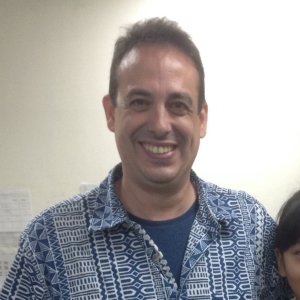
 1
1













